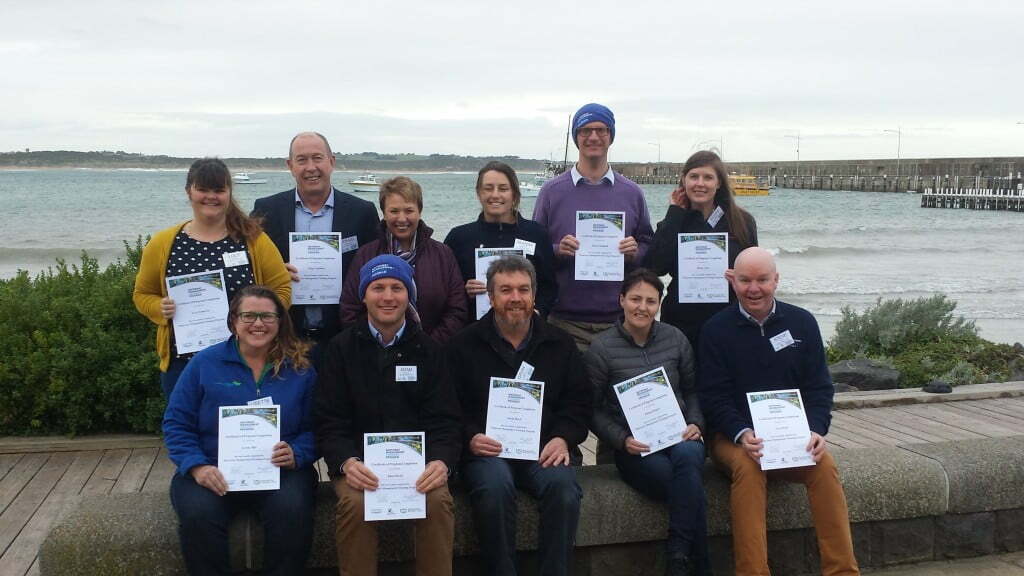In 2013, the Glenelg Hopkins CMA won the National Riverprize. Glenelg Hopkins CMA was required to share expertise and understanding with other organisations working in river restoration. Rather than focusing the $50,000 allocated to this activity on one organisation through a typical twinning arrangement, the Glenelg Hopkins CMA decided to establish the Waterway Management Twinning Program. The ultimate aim of the Program is for participants to feel renewed, supported and excited about their role in delivering world class river protection and rehabilitation projects.
On a cold and blustery day at Lady Bay in Warnambool, Victoria, our inaugural Waterway Management Twinning Program participants came together to reflect on their year of working together, and to share their stories with others. The Program has used a mentoring approach, where partnerships have been created to focus on a particular waterway management issue. The issues chosen by this year’s participants have been wide ranging – how to effectively engage communities, scaling up (pardon the pun!) fish habitat restoration projects from small reach to catchment, how to make monitoring and evaluation reporting meaningful, and implementing the latest riparian restoration techniques.
The amount that was achieved over one year of working together is nothing short of amazing, and in future updates we will connect you to the stories written by participants about their work together. The reason this partnership approach works is because it is based on mentoring which is:

Mentoring is a powerful way of effecting change in organisations. This is because mentoring focuses on supporting an individual to achieve their goals in a way that is collaborative, personal and uniquely human. People are social beings, yet in our fast-paced world we often neglect to invest in the relationships with peers and colleagues that sustain us. Mentoring creates an opportunity for two people to develop a relationship of trust and respect, and to work on a project that combines their skills, expertise and enthusiasm. The role of the professional Program Team is to support the mentor/mentees and further extend their skills and understanding through workshops that cover both personal and professional development topics.
The response from the ten participants involved has been overwhelmingly positive, with solid relationships established and a range of projects undertaken. What has become clear, is that there are very few opportunities for people working in natural resources management to access the sorts of resources and support the Waterway Twinning Management Program has provided. Most coaching and leadership programs are beyond the reach of people due to their highly competitive nature, or cost. Mentoring is, in contrast, relatively inexpensive, and develops skills that can be taken back into the workplace and easily shared with others.
Our class of 2015-2016 twinning partnership are:
- Lucy Cameron (Glenelg Hopkins CMA) and James Shaddick (North Central CMA)
- Lisette Mill (Basalt to Bay) and Gavin Brock/Alanna Wright (Melbourne Water)
- Craig Copeland (OzFish) and Steven Ryan (Glenelg Hopkins CMA) and Renae Ayres (Arthur Rylah Institute)
- Adam Bester (Glenelg Hopkins CMA) and Emma Wolters (North Central CMA)
This great group of people now form our Alumni and they are already working on ways to share what they have learnt with others.
In light of the success of this Program we are delighted that the Victorian Department of Water Environment Land and Planning has provided us with ongoing funding for another two years! This funding will enable us to establish a new website – twinningiswinning.com.au – as well as being able to offer the program to Victorians working in waterway management in 2017 and 2018. The ARRC and Glenelg Hopkins CMA will continue their great partnership and deliver the Program.
Myself and Adam Bester from the Glenelg Hopkins will be presenting on the Program next week at the Australian Stream Management Conference, so stay tuned for ongoing updates. Applications for the new Program will be open in October 2016.
Siwan
